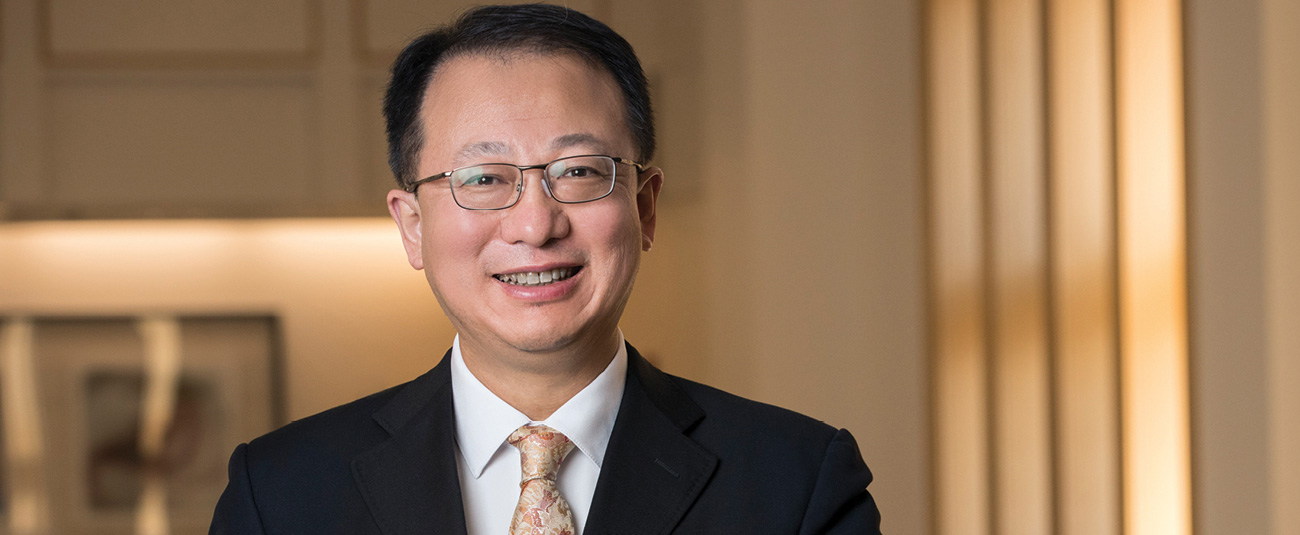Q&A with Joshua Yuan
As the new chair of Energy, Environmental & Chemical Engineering, Joshua Yuan brings considerable research and entrepreneurial experience
Meet Joshua Yuan, who joined the McKelvey School of Engineering in May as chair of the Department of Energy, Environmental & Chemical Engineering. Yuan brings his robust research in energy and environmental sustainability, as well as experience in entrepreneurship, to the growing department.
You’ve been here several months now. What have you learned about the department you didn’t know before?
I’m really proud of its inherent excellence and its aspirations for greatness. The department enjoys a very collegial environment and very strong support from Dean Aaron Bobick to achieve our goals. I’m really proud to be part of this department.
One thing I really like about the department is the aspiration for a better and bigger perspective for something higher than ourselves. I want to work together with the faculty to build up that aspiration to impact society and bring in sustainability for our future.
Why WashU and McKelvey Engineering? What brought you here?
First is the outstanding intellectual environment of the department. In 2016 I was a seminar speaker here. I was impressed with our faculty. I also have a grant with Young-Shin Jun and Yinjie Tang (professors of energy, environmental & chemical engineering) and have submitted grants with Richard Axelbaum (the Stifel & Quinette Jens Professor of Environmental Engineering Science), and several proposals with other faculty. My background fits into the department very well to work with different faculty and build collective excellence.
Second is the excellence of the department. It is a very young department that has a high expectation and aspiration for itself. The faculty support the need to improve our rankings and funding, to build a robust program and recruit excellent graduate students. I have heard the same consistent message for the pursuit of excellence from almost every faculty member, and you can’t find that everywhere.
Also, I’m at a career stage where I’m looking for a bigger impact and empowering more success beyond myself. That’s why I see this as a unique opportunity.We believe that this department is about the student, but not only about the students, it is about the future of our society as we play an important role in and building a sustainable future. This degree is not just for themselves; it’s also for something bigger and for the future of our society.
What are your priorities for the first year?
The first thing I need to do is listen. We spent the summer listening to the faculty, and that synergized with a faculty retreat where we identified 12 points that we are going to work on. Some of those points are revisiting the PhD program to make it more efficient and productive; enhancing the master’s program; revisiting the class design and building a departmental structure that reflects the National Academy of Engineering’s Grand Challenges; enhancing equity, diversity and inclusion through recruiting and Historically Black Colleges and Universities (HBCU) partnership; and building a new teaching lab for the undergraduate program. This 12-point action plan is the roadmap that the faculty identified at the retreat, and I will work with the faculty, the committees and the program directors to advance the roadmap so that it can be implemented effectively.
What are the strengths of the department, and where do you see opportunities for growth?
If we want to analyze the growth, we need to analyze two dimensions. One is the future need of society, which is so often reflected in the federal funding trend and industry need. The other is to analyze where our strength is and how the two align with one another.
Congress recently passed the Bipartisan Infrastructure Law, which is the largest investment in U.S. infrastructure and technology in recent years. I started my career in 2008 during the Obama administration when American Recovery and Reinvestment Act (ARRA) was passed, which was a huge influx of funding for a junior professor. I started my career too late to take advantage of it. The current legislative initiative is an even bigger opportunity, because besides the Bipartisan Infrastructure Law, Congress recently passed the CHIPS and Science Act and the Inflation Reduction Act, which have a significant investment in climate change. We are seeing a huge influx of investment in carbon capture and use, renewable hydrogen, renewable energy and carbon sequestration.
Since July 1, 2022, our faculty have brought in more than $20 million in new grants and contracts, and we are on a trajectory of tripling last year’s total grants and contracts and doubling the historical high of the department.
We see the growth in addressing the needs in climate change, in renewable energy, infrastructure and environmental sustainability. Our department also is trying to engage local industry as partners to build translational programs. Our time has come, and we need to capture this opportunity within the department.
How do you plan to connect with the other departments and with outside collaborators?
WashU has one of the best medical schools in the world. Our department has strengths in environmental microbiology and environmental technology, and we can provide a lot of empowerment for medical technologies in different ways. We see a lot of opportunity for EECE to contribute to health initiatives, including environmental health, global health and different types of medical therapeutics and devices. Having a closer collaboration with the medical school is another way to grow our department.
We also are collaborating with other departments in the school, including Computer Science & Engineering (CSE). Artificial intelligence has transformed everything. We recently launched seed grants with CSE to promote collaborations across the departments. I am very impressed with the collegial environment in McKelvey Engineering and how Dean Bobick supports interdisciplinary collaborations. We also are talking about building collaboration with the Department of Chemistry, the Brown School and other units, as well as building international interdisciplinary collaboration.
Back to Engineering Momentum
